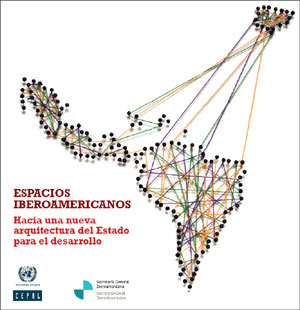Press Release
(27 October 2011) The Economic Commission for Latin America and the Caribbean (ECLAC) presents the publication Ibero-American Space: Towards a new State architecture for development with the aim of contributing to the debate between the Chiefs and Heads of State and of Government who will take part in the 21st Ibero-American Summit in Asuncion, Paraguay, on 28 and 29 October.
The document stresses the importance of creating fiscal and social pacts in the countries of the region, since "the new State architecture will only be possible with a new State-market-society balance which increases the resources available in order to achieve the development objectives".
The States which we have today "have not achieved sufficient credibility as providers of public goods, raisers of fiscal revenue, guarantors of social well-being or promoters of productivity and employment," say the Executive Secretary of ECLAC, Alicia Bárcena, and the Secretary-General of the Ibero-American Secretariat (SEGIB), Enrique V. Iglesias, in the foreword.
"We are convinced that a new State architecture is required which enables the State to play a more central role in ensuring general well-being and in driving development strategies in our countries," added the representatives.
They say that "the State role is to provide public goods (that is to say, to drive the public process through which these goods are available), make adjustments to income distribution and contribute to macroeconomic stabilization."
Among the challenges of public management, the ECLAC document identifies the need to share visions and long term strategies, carry out territorial planning, create more transparent proposals, evaluate the results of government activity and assess public policies and programmes, among others.
The publication has three chapters. The first chapter outlines the unfinished tasks in the area of growth and investment, productive development, employment and unemployment, poverty, income inequality, gender, climate change, the digital gap, infrastructure and tax systems, among others.
The second chapter proposes several political guidelines in areas such as macroeconomics, productive convergence, territorial cohesion, employment, social protection and the environment, while the last chapter examines the main challenges to public management in the region.
Any queries should be addressed to the ECLAC Public Information and Web Services Section. E-mail: dpisantiago@cepal.org; Telephone: (56 2) 210 2040.


